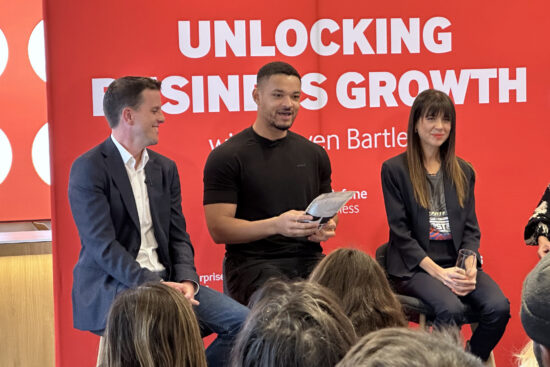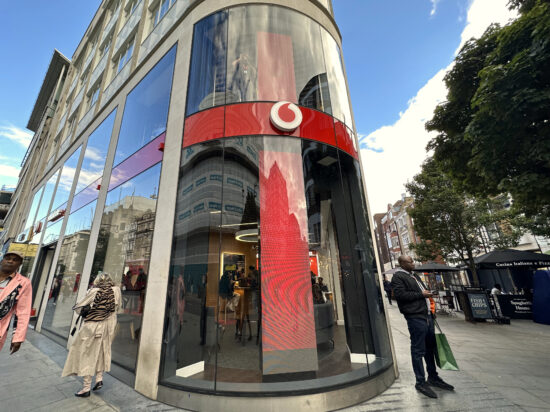As the UK economy is roiled by choppy waters, powerhouse entrepreneurs Kat Pither and Steven Bartlett gave their advice to other small business owners at an event marking the launch of Vodafone Pulse Connect.
Serial entrepreneur Steven Bartlett and Yogi Bare founder Kat Pither dispensed their advice on how small businesses can survive tumultuous times to a standing room-only audience at Vodafone’s flagship Oxford Street store in London recently.
The two spoke to Emma Jones of Enterprise Nation, and fielded questions from the audience of small business owners, at the launch event for Vodafone Pulse Connect.
The two focused on the mindset and overall approaches that – they believe – company founders need to adopt in a landscape of increasing economic uncertainty and turbulence.
Pitching to investors
Steven was adamant that entrepreneurs should focus on as few things as possible and always take their own unique approaches to challenges. He gave his own example of making memorable pitches to investors by delivering custom-written letters in gold envelopes, rather than template-based emails easily dismissed by investors’ time-poor assistants.
A businessperson in the audience, from independent coffee company Perky Blenders, immediately and memorably followed his advice by handing Steven a custom bag of coffee.

Steven cautioned the audience on the importance of finding the right investors for their business – ones that share their vision – and how this can pay dividends down the line.
“When times get tough in your business, the investor runs your business. So, you’re not just looking for money. It’s finding people that have walked in your shoes before, to mitigate your mistakes that you’re inevitably going to make,” he said.
New perspectives
Kat Pither emphasised the importance of companies taking a fresh look at their business from the perspective of an outsider hearing about them for the first time.
“Use your own product! How many of you are testing your own business and services? When did you last log in to your website and mess around? When did you last take a step outside of yourself, and your business, and look at it as a stranger?”
She also advised entrepreneurs to focus on activities that will bring the greatest return for the least amount of effort. Especially those that help build-up the story they’re creating for their business and help create a brand or products that people will love.
Working from home
When asked how businesses can keep team members and employees working remotely from home motivated, Steven’s answer was based on psychology.
“Autonomously working towards a meaningful challenge – when people have a high degree of personal control, no matter what they’re doing – their levels of motivation and satisfaction surge.
“When something is not a challenge, we become demotivated.”
Toughing it out
Kat advised businesses to be empathetic towards partners, clients and customers going through their own tough times.
“Ask them how you can support them and they won’t forget you when everything turns around. We’re going to get out the other side of this together,” she insisted.

Steven emphasised the importance of self-care in helping to prevent “suboptimal” decision-making. He gave his own very personal example of how he used a wearable sleep tracker to discover how little good-quality sleep he was actually getting, and how it was affecting his alertness while awake, leading him to adjust his bedtime habits and times to better match his circadian rhythms.
He was also keen that people should be self-aware about their own limitations.
“You can only do your best – I’m a mess, I’m unorganised, I’m scrappy sometimes. One of the reasons it’s been okay is because my expectation of myself is that I am a mess, so I don’t get demotivated or beat myself up about it.
“You’re probably a mess in many ways too – I am and that is fine. The thing is perseverance.”
Final words
Kat was keen that the audience should “celebrate your wins – that’s the thing we often forget to do!”
And Steven urged the audience to weed out as many inefficiencies in their business as possible and to focus on what they do their best. He used the example of Vodafone Pulse Connect, which combines multiple business technology services together onto a single bill, which saves business owners from having multiple invoices scattered around.
As Emma Jones CBE of Enterprise Nation so succinctly put it: “Focus on what you do best and outsource the rest – we outsource our technology to Vodafone!”
Stay up-to-date with the very latest news from Vodafone by following us on Twitter and signing up for News Centre website notifications.









